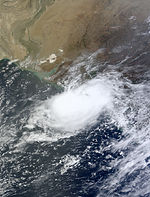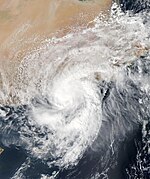2011 North Indian Ocean cyclone season
| 2011 North Indian Ocean cyclone season |

Season summary map
|
| Seasonal boundaries |
| First system formed |
February 2, 2011 |
| Last system dissipated |
December 31, 2011 |
| Strongest storm |
|
| Name |
Thane |
| • Maximum winds |
140 km/h (85 mph)
(3-minute sustained) |
| • Lowest pressure |
969 hPa (mbar) |
| Seasonal statistics |
| Depressions |
10 |
| Deep depressions |
6 |
| Cyclonic storms |
2 |
| Very severe cyclonic storms |
1 |
| Super cyclonic storms |
0 |
| Total fatalities |
360 total |
| Total damage |
At least $277 million (2011 USD) |
| Related articles |
|
|
North Indian Ocean tropical cyclone seasons
2009, 2010, 2011, 2012, 2013
|
| Depression (IMD) |
|
|
| Duration |
February 2 – February 3 |
| Peak intensity |
45 km/h (30 mph) (3-min) 1002 hPa (mbar) |
| Depression (IMD) |
| Tropical storm (SSHWS) |
|
|
| Duration |
June 11 – June 12 |
| Peak intensity |
45 km/h (30 mph) (3-min) 996 hPa (mbar) |
| Deep Depression (IMD) |
|
|
| Duration |
June 16 – June 23 |
| Peak intensity |
65 km/h (40 mph) (3-min) 978 hPa (mbar) |
| Depression (IMD) |
|
|
| Duration |
July 22 – July 23 |
| Peak intensity |
35 km/h (25 mph) (3-min) 990 hPa (mbar) |
| Depression (IMD) |
|
|
| Duration |
September 22 – September 23 |
| Peak intensity |
45 km/h (30 mph) (3-min) 995 hPa (mbar) |
| Deep depression (IMD) |
| Tropical storm (SSHWS) |
|
|
| Duration |
October 19 – October 20 |
| Peak intensity |
55 km/h (35 mph) (3-min) 1000 hPa (mbar) |
| Cyclonic storm (IMD) |
| Tropical storm (SSHWS) |
|
|
| Duration |
October 29 – November 4 |
| Peak intensity |
65 km/h (40 mph) (3-min) 996 hPa (mbar) |
| Deep depression (IMD) |
| Tropical storm (SSHWS) |
|
|
| Duration |
November 6 – November 10 |
| Peak intensity |
55 km/h (35 mph) (3-min) 1000 hPa (mbar) |
| Deep depression (IMD) |
| Tropical storm (SSHWS) |
|
|
| Duration |
November 26 – December 1 |
| Peak intensity |
55 km/h (35 mph) (3-min) 998 hPa (mbar) |
The 2011 North Indian Ocean cyclone season was the least active tropical cyclone season in the North Indian Ocean since 1993. Only two cyclone storms have formed throughout the year, far below the average of 4-6. The North Indian Ocean cyclone season has no official bounds, but cyclones tend to form between April and December, with peaks in May and November. These dates conventionally delimit the period of each year when most tropical cyclones form in the northern Indian Ocean. The scope of this article is limited to the Indian Ocean in the Northern Hemisphere, east of the Horn of Africa and west of the Malay Peninsula. There are two main seas in the North Indian Ocean — the Arabian Sea to the west of the Indian subcontinent, abbreviated ARB by the India Meteorological Department (IMD); and the Bay of Bengal to the east, abbreviated BOB by the IMD.
This is the first season to have only two named storms since the 1993 North Indian Ocean cyclone season. However, multiple Depressions along with Cyclonic Storm Keila and Very Severe Cyclonic Storm Thane wreaked damage worth at least US$1.64 million and killing some 360 people overall. It is believed that El Niño, a quasiperiodic climate pattern that causes a rise in surface pressure over the Indian Ocean and makes the region drier is the main cause behind the below normal activity in the basin.
This season, 9 depressions developed out of low pressure areas, with six intensifying further into deep depressions, two deep depressions have developed into cyclonic storms, and one cyclonic storm intensified into a severe cyclonic storm. The first depression of the season developed on February 2 about 300 km (190 mi) to the east of Colombo, Sri Lanka. The depression brought isolated rainfall to parts of Sri Lanka, while remaining near stationary before weakening into an area of low pressure early the next day.
Depression ARB 01 formed in early June near India, before Deep Depression BOB 02 formed a few days later. Land Depression 01 formed on July 22, and dissipated a day later. Depression BOB 03 formed on September 22, and soon made landfall on India. Depression BOB 03 dissipated the next day, on September 23. October was a much more active month, as Deep Depression BOB 04 and Deep Depression ARB 02 both formed, during this period of time. Then Cyclonic Storm Keila formed in November and came ashore in Oman, before Depression ARB03 formed and dissipated near the Oman coast.
...
Wikipedia



















